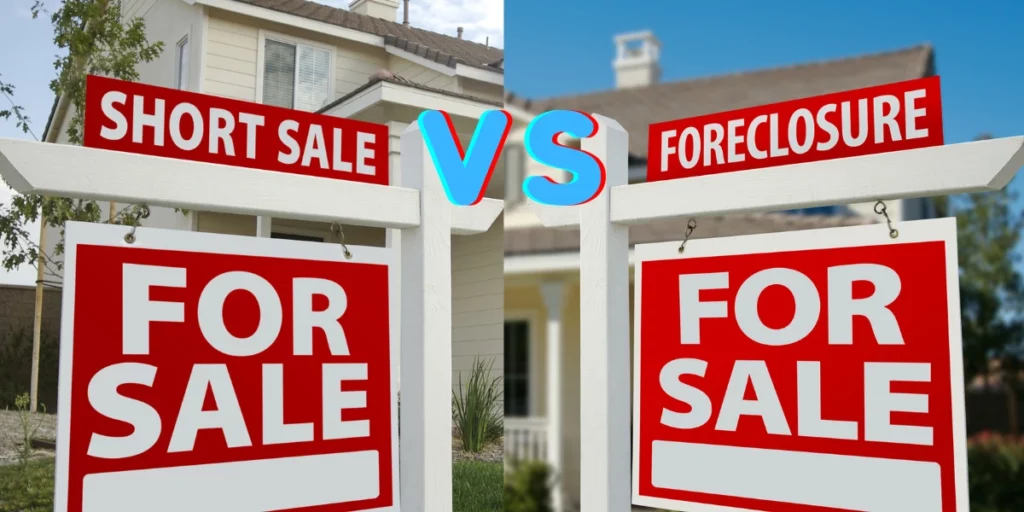Short Sale vs. Foreclosure – What’s the Difference?

Introduction
If you’re reading this article, it’s likely that you’re facing a difficult financial situation, and you’re considering your options to avoid foreclosure. Perhaps you’ve heard of both short sales and foreclosures, but you’re unsure about what each term means or how they could impact your future. The last thing you want is to make a decision that could further hurt your financial well-being or your credit score. You might be searching for a way to avoid foreclosure, but you’re also trying to understand whether a short sale might be a better choice for you. You may be looking for alternatives that allow you to move forward without the damage that comes with foreclosure.
In this blog, we’ll explain the key differences between a short sale and foreclosure, the costs and consequences of each, and why selling your home to a real estate investor could be a better option in many cases. We’ll go into detail about the process, costs, potential credit impacts, and which option might be more beneficial for your situation. By the end, you’ll have a clearer understanding of both processes, and you’ll be able to make an informed decision based on your specific needs and circumstances.
What is a Short Sale?
A short sale occurs when a homeowner sells their property for less than the amount they owe on the mortgage, with the lender’s approval. It is typically used as an alternative to foreclosure, where the lender agrees to take a reduced payoff to settle the loan. The process of a short sale can be lengthy and complex, but it offers homeowners a chance to avoid the long-term consequences of a foreclosure.
A key point to understand about short sales is that the lender must approve the sale, and this approval can take time—often several months. You’ll need to submit various financial documents to demonstrate your inability to repay the full loan, and in some cases, the lender might still require you to contribute towards the deficiency, or the remaining balance after the sale.
For more detailed insights into short sales and the legal aspects, check out this guide from Investopedia on short sales for a deeper understanding of how this process works.
The Advantages of a Short Sale
The primary benefit of a short sale is that it can help you avoid the long-lasting negative impact that foreclosure can have on your credit score. Short sales generally cause less damage to your credit than foreclosures, with many homeowners seeing their credit score drop by only 50-130 points, while foreclosures can cause a much steeper decline of 200+ points. Additionally, a short sale can provide an opportunity for a quicker recovery, allowing you to potentially purchase another home in just a few years, whereas a foreclosure can leave you out of the market for much longer.
For example, if you’re in financial hardship but have a valid reason, like medical bills or job loss, a lender may be more willing to accept a short sale to avoid the cost and legal proceedings associated with a foreclosure. Moreover, a short sale can sometimes be more attractive to buyers since it’s a voluntary sale rather than a forced auction like a foreclosure.
Learn about how a short sale affects your credit score by reading this informative article from Experian, which provides insights into how a short sale can impact your financial future and credit history.
Disadvantages of a Short Sale
While a short sale may seem like a viable alternative to foreclosure, it does come with its drawbacks. The process can take several months, and there’s no guarantee that the lender will approve the sale. During this time, you may still be responsible for mortgage payments, and the property may lose value, potentially resulting in a lower sale price than anticipated. Additionally, some lenders might require you to contribute toward the deficiency, or the difference between the sale price and the amount owed on the loan. This means you could still owe money even after the property is sold.
It’s also important to note that a short sale, while less damaging than foreclosure, is still considered a negative event on your credit report. This could impact your ability to secure future credit. In some cases, the lender might pursue a deficiency judgment, which could have long-term financial implications. For further details on the potential tax consequences of a short sale, you can refer to IRS Publication 4681 on debt cancellation.
What is Foreclosure?
Foreclosure occurs when a lender takes possession of a property due to the homeowner’s failure to make mortgage payments. When you fall behind on mortgage payments, the lender can initiate legal proceedings to take ownership of the property and sell it at auction to recover the remaining loan balance.
Unlike a short sale, you lose control over the sale of the property during a foreclosure. The lender will handle the sale process and the auction, often resulting in a much lower sale price than what you might have received if you were able to sell it yourself. Foreclosures are typically a last resort for lenders, as they are costly and time-consuming.
The Advantages of Foreclosure
There’s not much to like about foreclosure, but one potential advantage is that you can be rid of the property quickly, which might relieve you of some emotional and financial burdens. In some cases, foreclosures may lead to a faster resolution than a short sale if your financial situation is too dire to continue paying for the house. The bank will take ownership, and the home will be sold at auction, which can happen relatively quickly compared to the drawn-out short sale process.
Another potential advantage is that once the foreclosure process is completed, you may be able to walk away from the property without the lender asking for a deficiency balance, though this depends on the state and lender.
Disadvantages of Foreclosure
While foreclosure may seem like the faster route, it comes with serious consequences. Foreclosure can have a much more significant negative impact on your credit score compared to a short sale. While a short sale may reduce your credit score by 50-130 points, foreclosure can drop your score by 200+ points. This can severely affect your ability to secure future credit, whether it’s a car loan, personal loan, or a new mortgage.
Additionally, the emotional and psychological toll of losing your home in foreclosure can be significant. There’s also a public auction process involved, which might further increase your stress and embarrassment, especially if you have personal or financial connections in the community.
Lastly, while foreclosure can provide a “clean break” from your home, the damage to your credit can last for up to seven years. This will make it harder for you to buy a home again, and you may face higher interest rates on loans in the future.
Key Differences Between Short Sale and Foreclosure
Now that we’ve defined both terms, let’s break down the key differences between a short sale and foreclosure.
- Control over the Process:
In a short sale, you have some control over the sale process. You can work with a real estate agent, set the price, and negotiate with the lender. In foreclosure, however, the bank takes over the process entirely, and the property is sold at auction. - Impact on Your Credit:
A short sale has a less severe impact on your credit than foreclosure. While both events will cause some damage, a foreclosure typically results in a larger score drop, making it harder for you to get credit in the future. - Time Frame:
Short sales can take several months to complete, depending on how long it takes for the lender to approve the offer. Foreclosures, on the other hand, can be completed more quickly, but the process is much more stressful and often results in a lower sale price. - Deficiency Balances:
With a short sale, the lender may still pursue you for the remaining balance after the sale, although some states have laws preventing this. In a foreclosure, the lender may also pursue a deficiency balance, but they typically sell the property at auction and forgive the difference. - Emotional Impact:
A short sale can be less emotionally draining, as you maintain some control over the process and may feel that you’re able to resolve things amicably with the lender. Foreclosure, on the other hand, is a more invasive process and can feel like an uncontrollable loss.
If you’re still unsure about how to avoid foreclosure, explore our complete guide on How to Stop the Bank from Foreclosing on Your Maryland House to discover your best next steps.
The Costs of a Short Sale vs. Foreclosure
When it comes to selling your home, the financial costs of both short sales and foreclosures can vary widely. Both options may come with costs you hadn’t anticipated, but they can be easier to manage than the ongoing financial strain of holding onto a property you can no longer afford.
Costs of a Short Sale
While you may be able to sell your home for less than you owe, there are still costs involved. You may have to pay for agent commissions, closing costs, and possibly attorney fees. Additionally, if your lender requires a deficiency balance, you may still owe money after the sale. However, in some cases, lenders might agree to forgive this amount.
Costs of Foreclosure
Foreclosure comes with substantial costs. Not only will the lender incur expenses associated with the legal proceedings, but you may also end up owing money if the sale price doesn’t cover your mortgage balance. The cost of foreclosure is typically much higher for both the homeowner and the lender.
Additionally, the emotional toll of losing your home in foreclosure can’t be underestimated. Beyond just the financial costs, the psychological impact may add up to a significant personal cost, which should be factored into your decision.
Why Selling to Simple Homebuyers Could Be Your Best Option
While both short sales and foreclosures offer solutions for homeowners in distress, they come with significant drawbacks—particularly when it comes to your financial health and emotional well-being. If you’re looking for a quicker, simpler, and less stressful solution, selling your home to Simple Homebuyers for cash might be the best choice.
At Simple Homebuyers, we specialize in buying homes as-is, which means you won’t have to worry about making repairs, paying agent commissions, or dealing with the long waiting periods of traditional sales. We offer fair cash offers, allowing you to sell your home fast, move on with your life, and avoid the negative impact of foreclosure or a short sale.
Selling to Simple Homebuyers not only provides you with a faster resolution, but it also helps you avoid the lasting consequences that both short sales and foreclosures can have on your credit score and future financial prospects. If time is a crucial factor and you’re looking to alleviate your financial burden quickly, selling your home to us could be the relief you need.
With Simple Homebuyers, you can bypass the complexities and uncertainties of short sales and foreclosures, and find a straightforward, stress-free path forward. Contact us today to learn more about how we can help you move on with your life, and get a fair cash offer for your home without the hassle.

